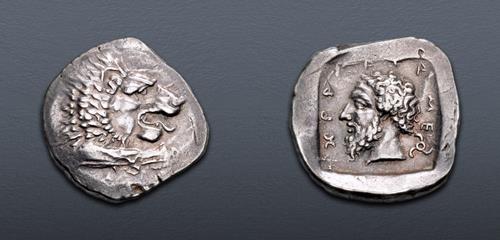|
DYNASTS of LYCIA. Mithrapata. Circa 390-370 BC. AR Stater (25.5mm, 9.86 g, 7h). Forepart of lion right / Head of Mithrapata left; MITHRAP-A-T-A in Lycian around, triskeles to lower right; all within incuse square. Mildenberg, Mithrapata 3 (dies 2/2); Podalia 37–50 (A2/P2); Müseler VII, 67–9 (same dies); Falghera –; SNG Copenhagen Supp. 472 var. (arrangement of letters); SNG Ashmolean 1200 (same dies); SNG von Aulock 4237 (same dies); Reuter 98 (same obv. die). Toned, usual minor die wear. Good VF.
From the JTB Collection. Ex Allan Smith, M.D. Collection (Classical Numismatic Group 102, 18 May 2016), lot 549; Classical Numismatic Group 99 (13 May 2015), lot 302.
The portraits on coins in the later Lycian series are among the finest of the Classical period. Among the earliest to attempt depictions of their rulers on coinage, the Lycians' first portraits in the later 5th century BC were innovative, but static, idealized forms lacking individual characterization. Over the next half-century, however, the style progressed significantly toward realism, culminating in the issues of the dynasts Mithrapata and Perikles in the early-mid 4th century BC. The coins of Mithrapata came first, depicting on their reverse the profile portrait of a man with distinctive elderly features. Through the relative chronology established in L. Mildenberg's die study, one can even see the portrait become more aged as time progressed, reflecting the realism that had been captured in these issues. The coins of Perikles, Mithrapata's successor, continue this trend, but also have two innovations that set them at the pinnacle of classical portraiture. First, the portrait is moved to the obverse of the coin, emphasizing the importance of the individual. Second, and most prominently, the portrait is not in the traditional profile, but in a dramatic facing state. Obviously influenced by Kimon's facing Arethusa-head coinage at Syracuse, these depict Perikles looking out from the surface of the coin with a serene countenance and his hair flowing around him as if blown by the wind. This depiction captures the essence of the earlier idealized portraits, conveying to the viewer a sense that Perikles was more than a mere man, but retaining the realism in its individualized features. Interestingly, both Mithrapata and Perikles are depicted without any sort of satrapal headgear, which was always included in earlier Lycian portraits, perhaps indicating that they had declared their independence from the Persian king. Unfortunately, these astonishing developments in portraiture came to an abrupt end in Lycia when Maussollos of Caria invaded the region circa 360 BC.
The final winners of all Triton XXV lots will be determined at the live public sale that will be held on 11-12 January 2022. Triton XXV – Session One – Greek Coinage (Part 1) will be held Tuesday morning, 11 January 2022 beginning at 9:00 AM ET.
Winning bids are subject to a 20% buyer's fee for bids placed on this website and 22.50% for all others.
We recognize that our users may have various Internet Browsers and Operating Systems. We like our visitors to have the best possible experience when using our bidding platform. However, we do recognize that it is impossible to develop applications that work identically, efficiently and effectively on all web browsers. The CNG bidding platform supports the latest stable major version and the stable previous version of Mozilla Firefox and Chrome.
|
